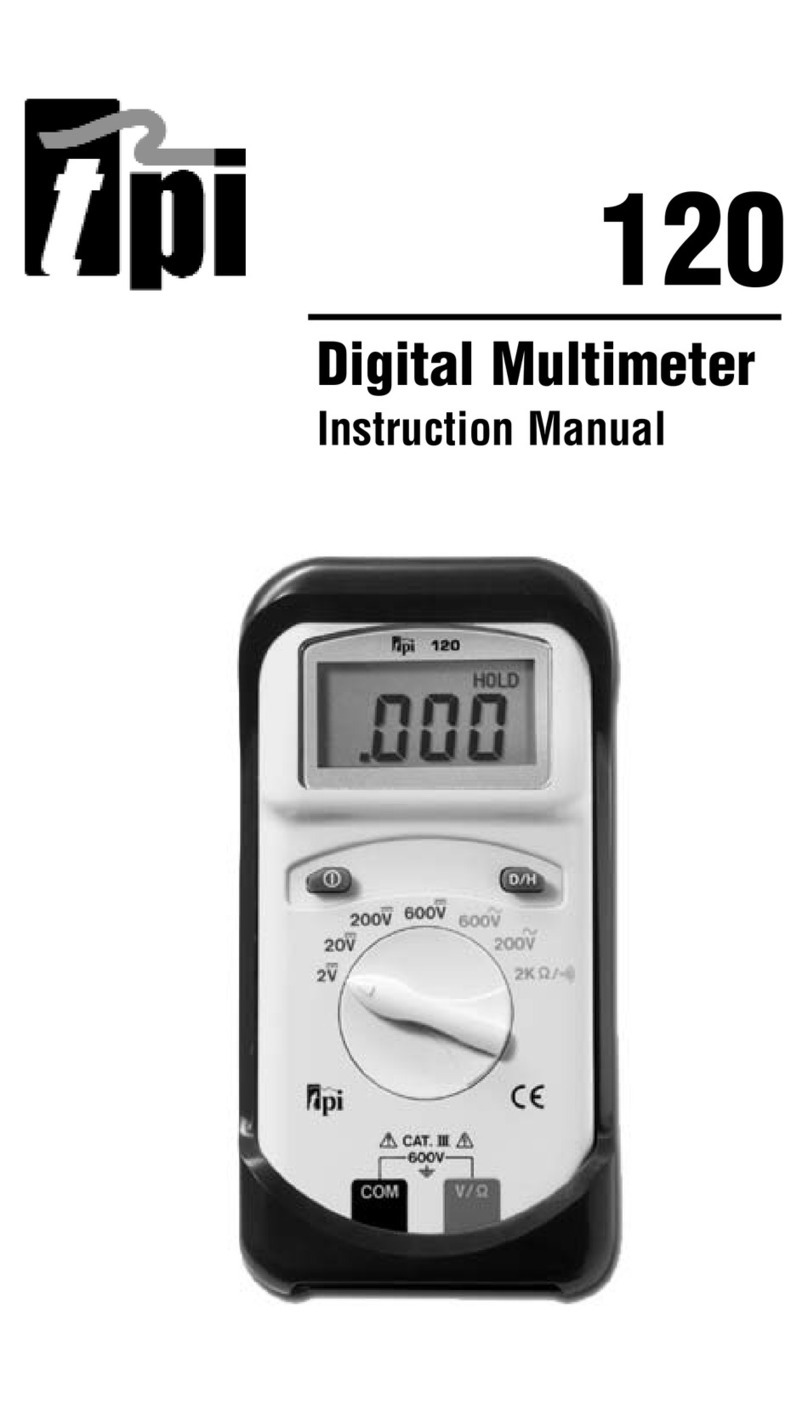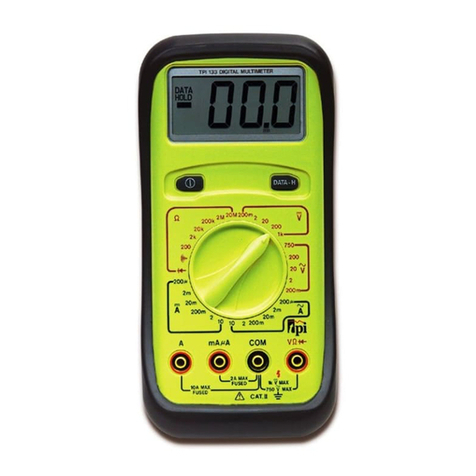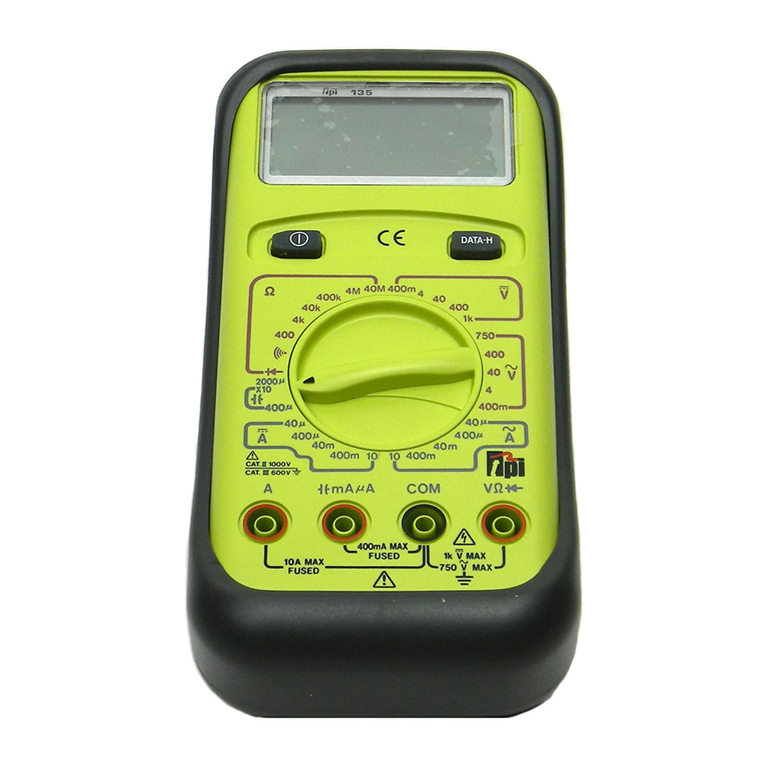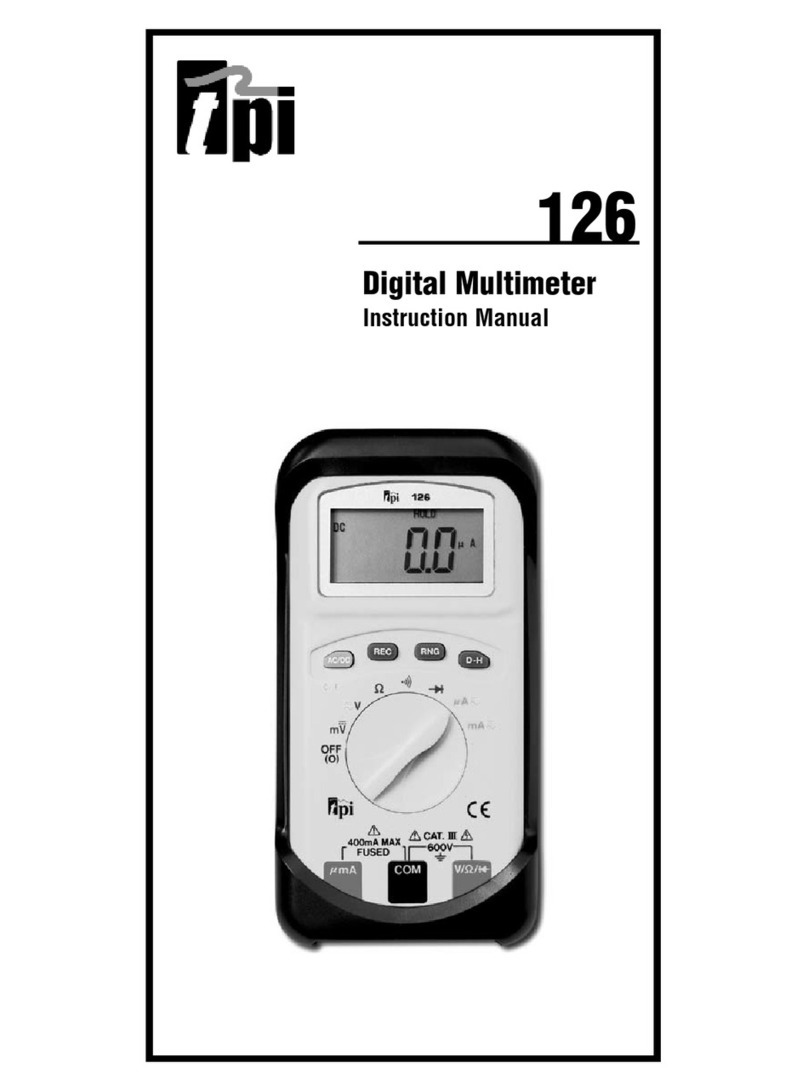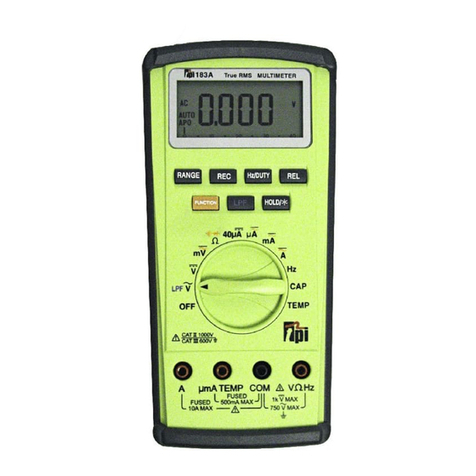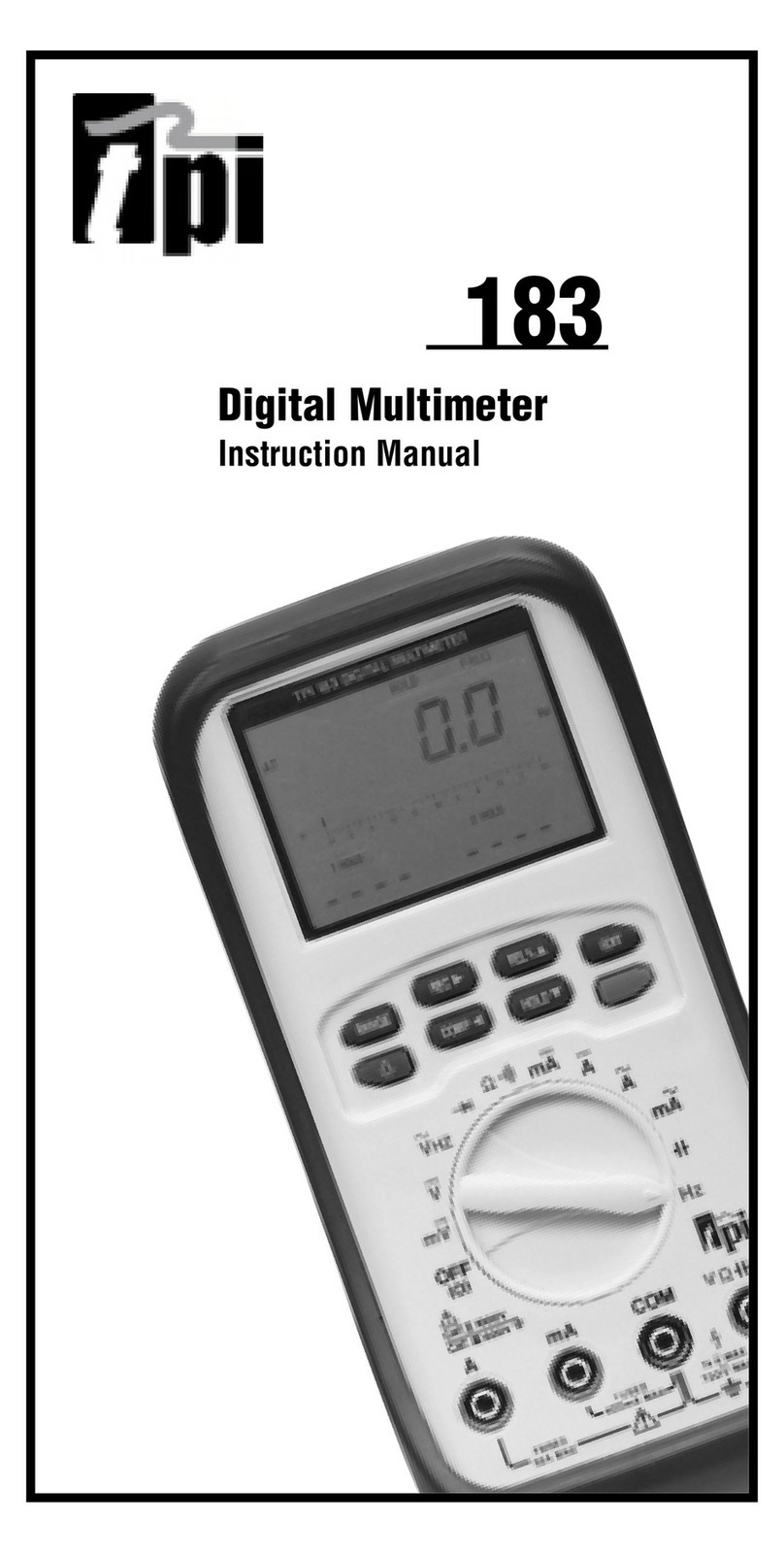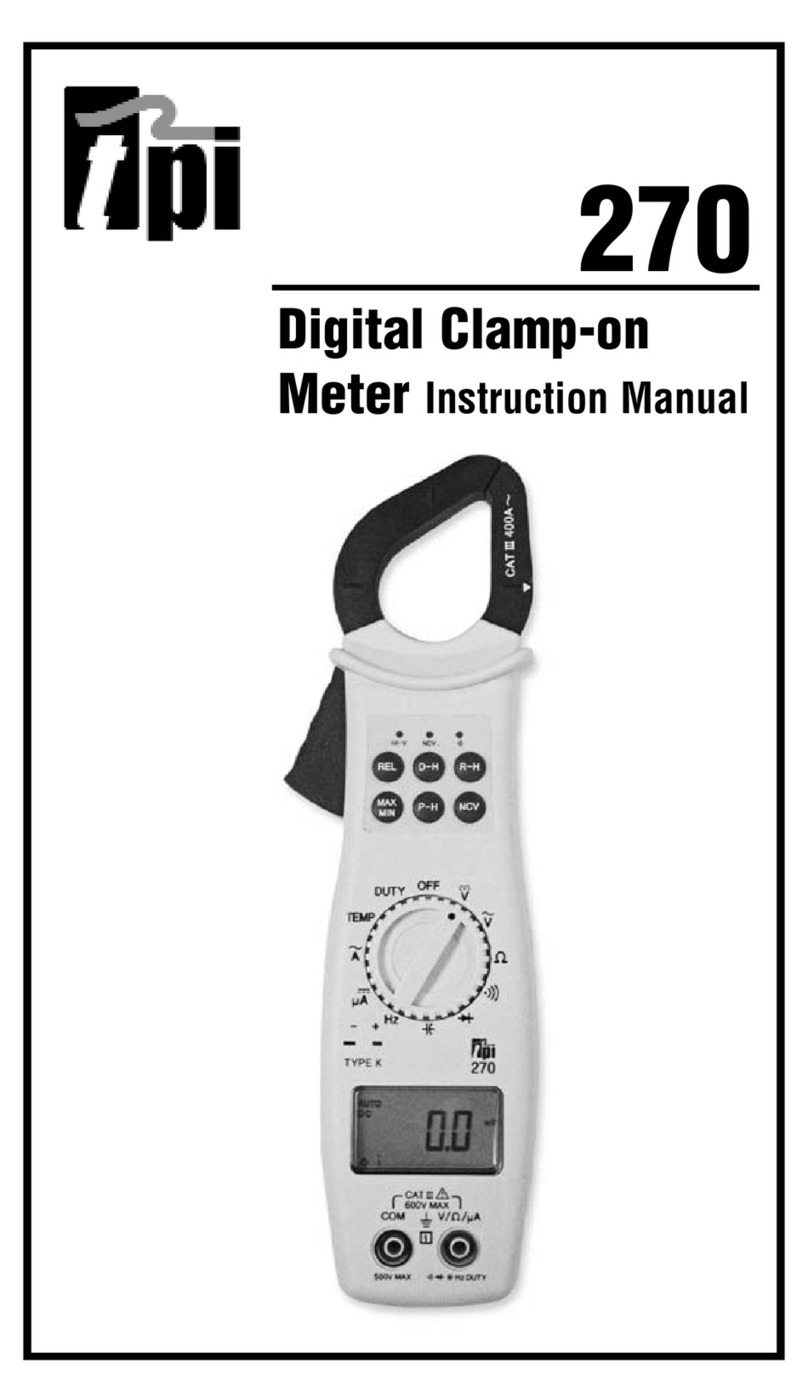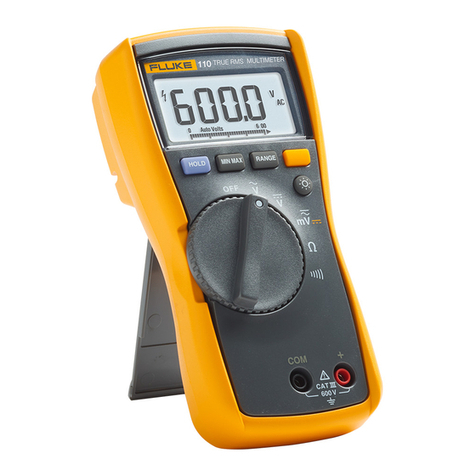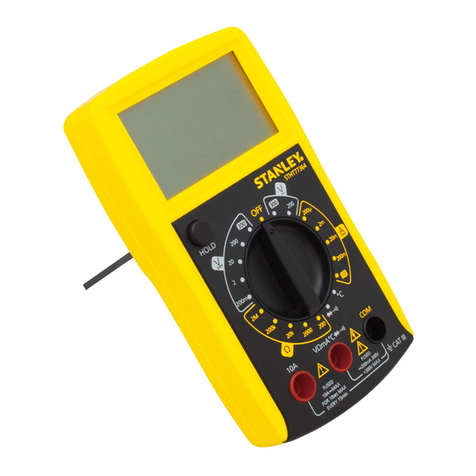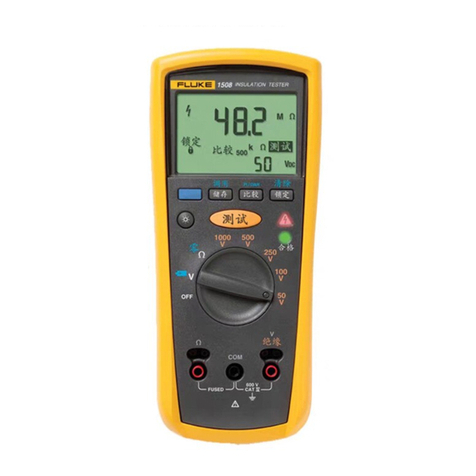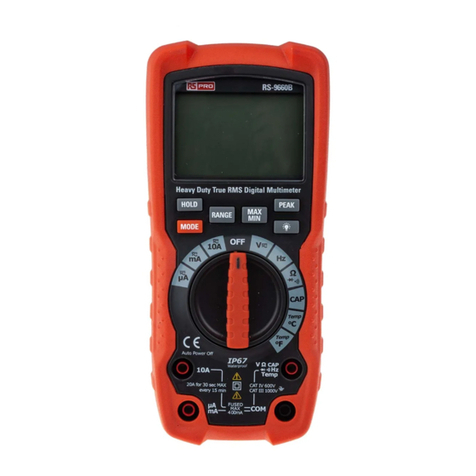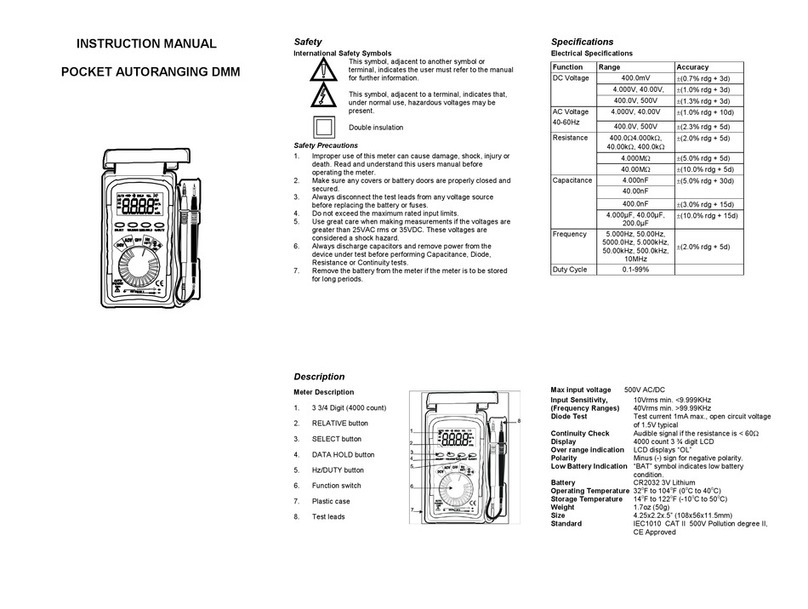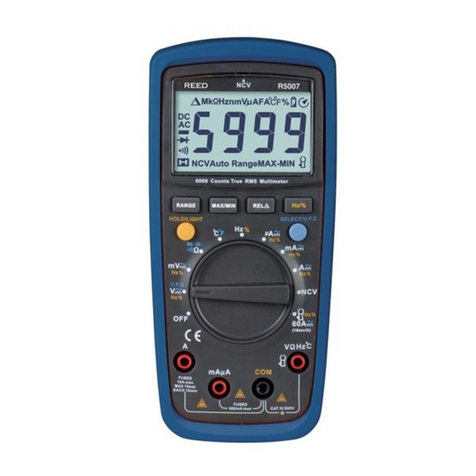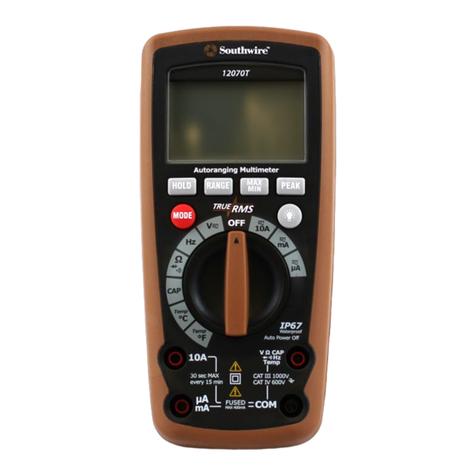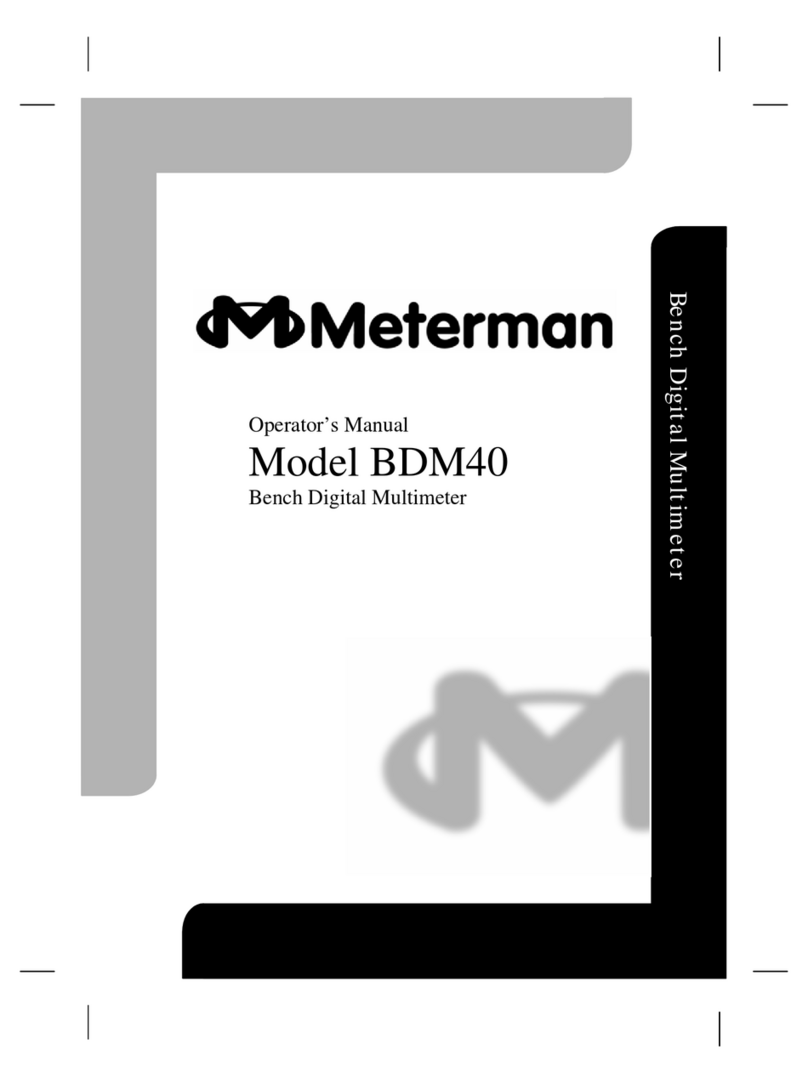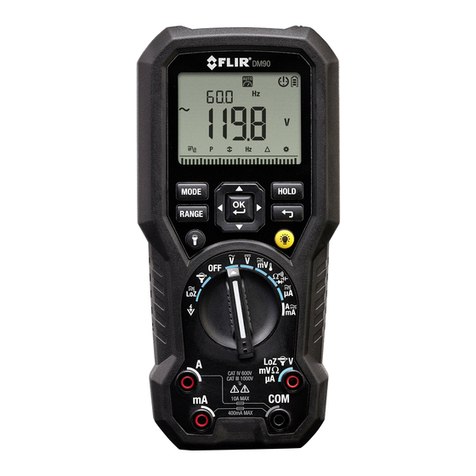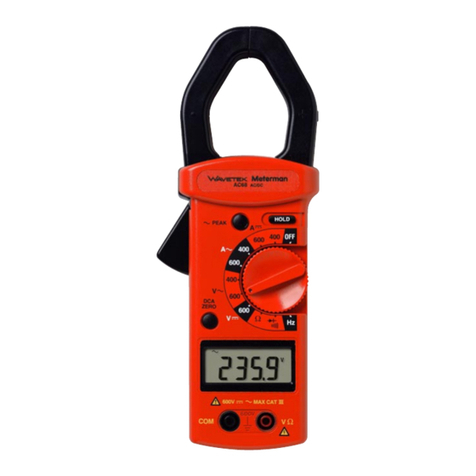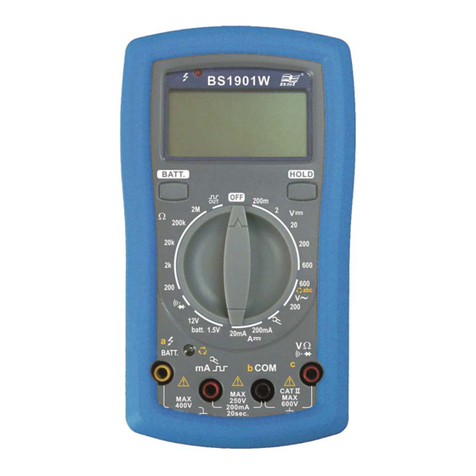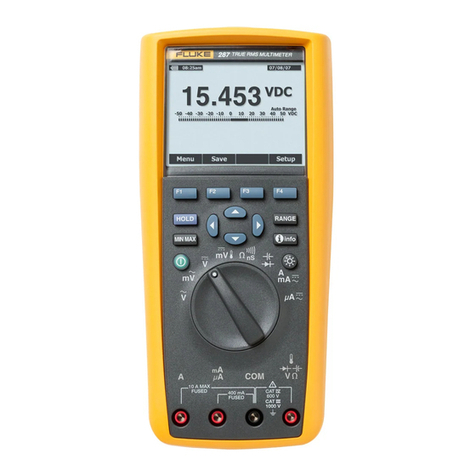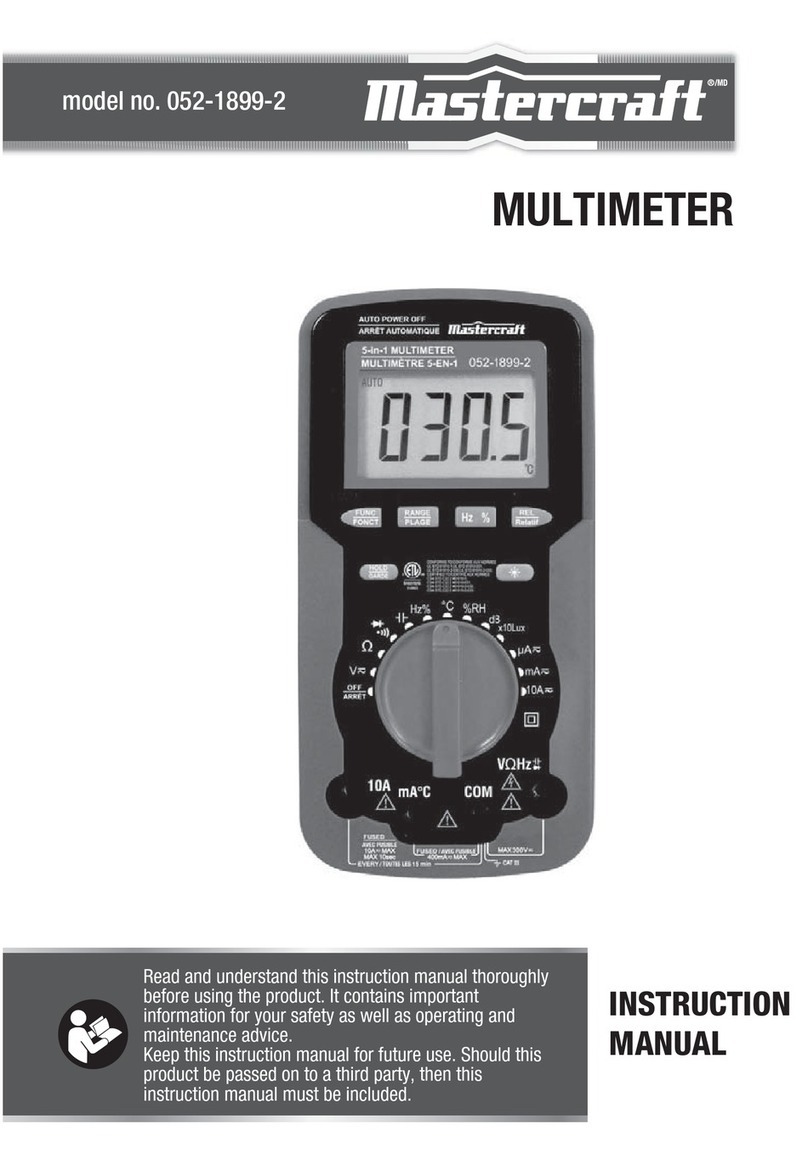TPI 126 User manual

126
Digital Multimeter
Instruction Manual
www. .com information@itm.com1.800.561.8187

2 3
A. INTRODUCTION
1. Congratulations!!
Thank you for purchasing TPI brand products. The meter is
easy to use and is built to last. It is backed by a 3 year
limited warranty. Please remember to complete and return
your product warranty registration card.
2. Product Description
The 126 is a hand-held autoranging DMM. The 126
measures ACV, DCV, ACA, DCA, Resistance, Diodes and
Continuity.
The 126 also features:
•REC Records Min/Max readings during
specified measurement intervals.
•AC/DC Toggles between AC/DC volts and Amps.
•RANGE Allows the user to manually range the
126 instead of autoranging.
•Data Hold Holds the reading on the display for
easy viewing.
•Auto Off Preserves battery life.
The 126 comes complete with the following accessories:
126 Instrument
Rubber Boot
Test Lead Set
Instruction Manual
Battery
TABLE OF CONTENTS
page
A. INTRODUCTION
1. Congratulations . . . . . . . . . . . . . . . . . .3
2. Product Description . . . . . . . . . . . . . .3
3. EC Declaration of Conformity . . . . . . . .4
B. SAFETY CONSIDERATIONS . . . . . . . . . . . .5
C. TECHNICAL DATA
1. Features and Benefits . . . . . . . . . . . . .6
2. Product Applications . . . . . . . . . . . . . .7
3. Specifications . . . . . . . . . . . . . . . . . . .8
D. MEASUREMENT TECHNIQUES
1. Controls and Functions . . . . . . . . . .10
2. Step by Step Procedures:
a) Measuring DC Volts . . . . . . .13
b) Measuring AC Volts . . . . . . .15
c) Measuring DC Amps . . . . . .16
d) Measuring AC Amps . . . . . .17
e) Measuring Resistance . . . . .19
f) Measuring Diodes . . . . . . . .20
g) Continuity Buzzer . . . . . . . .21
h) Data Hold . . . . . . . . . . . . . .21
i) Record Mode . . . . . . . . . . .22
E. ACCESSORIES . . . . . . . . . . . . . . . . . . . . .23
F. MAINTENANCE . . . . . . . . . . . . . . . . . . . .24
G. TROUBLE SHOOTING GUIDE . . . . . . . . . .25
www. .com information@itm.com1.800.561.8187

2 3
A. INTRODUCTION
1. Congratulations!!
Thank you for purchasing TPI brand products. The meter is
easy to use and is built to last. It is backed by a 3 year
limited warranty. Please remember to complete and return
your product warranty registration card.
2. Product Description
The 126 is a hand-held autoranging DMM. The 126
measures ACV, DCV, ACA, DCA, Resistance, Diodes and
Continuity.
The 126 also features:
•REC Records Min/Max readings during
specified measurement intervals.
•AC/DC Toggles between AC/DC volts and Amps.
•RANGE Allows the user to manually range the
126 instead of autoranging.
•Data Hold Holds the reading on the display for
easy viewing.
•Auto Off Preserves battery life.
The 126 comes complete with the following accessories:
126 Instrument
Rubber Boot
Test Lead Set
Instruction Manual
Battery
TABLE OF CONTENTS
page
A. INTRODUCTION
1. Congratulations . . . . . . . . . . . . . . . . . .3
2. Product Description . . . . . . . . . . . . . .3
3. EC Declaration of Conformity . . . . . . . .4
B. SAFETY CONSIDERATIONS . . . . . . . . . . . .5
C. TECHNICAL DATA
1. Features and Benefits . . . . . . . . . . . . .6
2. Product Applications . . . . . . . . . . . . . .7
3. Specifications . . . . . . . . . . . . . . . . . . .8
D. MEASUREMENT TECHNIQUES
1. Controls and Functions . . . . . . . . . .10
2. Step by Step Procedures:
a) Measuring DC Volts . . . . . . .13
b) Measuring AC Volts . . . . . . .15
c) Measuring DC Amps . . . . . .16
d) Measuring AC Amps . . . . . .17
e) Measuring Resistance . . . . .19
f) Measuring Diodes . . . . . . . .20
g) Continuity Buzzer . . . . . . . .21
h) Data Hold . . . . . . . . . . . . . .21
i) Record Mode . . . . . . . . . . .22
E. ACCESSORIES . . . . . . . . . . . . . . . . . . . . .23
F. MAINTENANCE . . . . . . . . . . . . . . . . . . . .24
G. TROUBLE SHOOTING GUIDE . . . . . . . . . .25
www. .com information@itm.com1.800.561.8187

5
B. SAFETY CONSIDERATIONS
WARNING: Please follow manufacturers test
procedures whenever possible. Do not attempt to
measure unknown voltages or components until a
complete understanding of the circuit is obtained.
GENERAL GUIDELINES
ALWAYS
• Test the 126 before using it to make sure it is
operating properly.
• Inspect the test leads before using to make sure
there are no breaks or shorts.
• Double check all connections before testing.
• Have someone check on you periodically if
working alone.
• Have complete understanding of circuit being
measured.
• Disconnect power to circuit then, connect test
leads to the 126, then to circuit being measured.
NEVER
• Attempt to measure unknown high voltages.
• Attempt to measure current with the meter in
parallel to the circuit.
• Connect the test leads to a live circuit before
setting up the instrument.
• Touch any exposed metal part of the test lead
assembly.
4
3. EC Declaration of Conformity
This is to certify that TPI model 126 conforms to the
protection requirements of the council directive
89/336/EEC, in the approximation of laws of the member
states relating to Electromagnetic compatibility and
73/23/EEC, The Low Voltage Directive by application of the
following standards:
EN 50081-1 1992 Emissions Standard
EN 50082-1 1992 Immunity Standard
EN61010-1 1993 Safety Standard
EN61010-2-031 1995 Safety Standard
EN61010-2-032 1995 Safety Standard
To ensure conformity with these standards, this instrument
must be operated in accordance with the instructions and
specifications given in this manual.
CAUTION:
Even though this instrument complies with the
immunity standards, the accuracy can be affect-
ed by strong radio emissions not covered in the
above standards. Sources such as hand held
radio transceivers, radio and TV transmitters,
vehicle radios and cellular phones generate
electromagnetic radiation that could be induced
into the test leads of this instrument. Care
should be taken to avoid such situations or
alternatively, check to make sure that the
instrument is not being influenced by these
emissions.
www. .com information@itm.com1.800.561.8187

5
B. SAFETY CONSIDERATIONS
WARNING: Please follow manufacturers test
procedures whenever possible. Do not attempt to
measure unknown voltages or components until a
complete understanding of the circuit is obtained.
GENERAL GUIDELINES
ALWAYS
• Test the 126 before using it to make sure it is
operating properly.
• Inspect the test leads before using to make sure
there are no breaks or shorts.
• Double check all connections before testing.
• Have someone check on you periodically if
working alone.
• Have complete understanding of circuit being
measured.
• Disconnect power to circuit then, connect test
leads to the 126, then to circuit being measured.
NEVER
• Attempt to measure unknown high voltages.
• Attempt to measure current with the meter in
parallel to the circuit.
• Connect the test leads to a live circuit before
setting up the instrument.
• Touch any exposed metal part of the test lead
assembly.
4
3. EC Declaration of Conformity
This is to certify that TPI model 126 conforms to the
protection requirements of the council directive
89/336/EEC, in the approximation of laws of the member
states relating to Electromagnetic compatibility and
73/23/EEC, The Low Voltage Directive by application of the
following standards:
EN 50081-1 1992 Emissions Standard
EN 50082-1 1992 Immunity Standard
EN61010-1 1993 Safety Standard
EN61010-2-031 1995 Safety Standard
EN61010-2-032 1995 Safety Standard
To ensure conformity with these standards, this instrument
must be operated in accordance with the instructions and
specifications given in this manual.
CAUTION:
Even though this instrument complies with the
immunity standards, the accuracy can be affect-
ed by strong radio emissions not covered in the
above standards. Sources such as hand held
radio transceivers, radio and TV transmitters,
vehicle radios and cellular phones generate
electromagnetic radiation that could be induced
into the test leads of this instrument. Care
should be taken to avoid such situations or
alternatively, check to make sure that the
instrument is not being influenced by these
emissions.
www. .com information@itm.com1.800.561.8187

76
INTERNATIONAL SYMBOLS
DANGEROUS VOLTAGE
AC (ALTERNATING CURRENT)
DC (DIRECT CURRENT)
REFER TO INSTRUCTION MANUAL
GROUND
FUSE
DOUBLE INSULATION
ON/OFF, PUSH BUTTON SWITCH
C. TECHNICAL DATA
1. Features and Benefits
Agency Approval Meets CE and IEC 1010 requirements.
Record Records Min/Max values.
Range Allows you to either manual range or
use auto range to select the appropri-
ate range.
Auto Off Preserves battery life. LCD shows oFF
when in this mode. Automatically
powers down after 30 minutes of
inactivity.
3 Year Covered by a standard 3 year warranty.
Warranty
2. Product Applications
Perform the following tests and/or measurements
with the TPI 126 and the appropriate function:
HVAC/R
FUNCTION
DCmV • Thermocouples in furnaces or gas
applications.
DCV • Thermocouples in furnaces of gas
applications. DC controlled circuits.
ACA • Heat anticipator current in thermostats.
ACV • Line voltage.
ACV or DCV • Control circuit voltage.
DCµA • Flame safeguard control current.
OHMS • Heating element resistance (continuity).
OHMS • Compressor winding resistance.
OHMS • Contactor and relay coil resistance.
OHMS • Continuity of wiring.
DCmV • Temperature with optional temperature
adapter (A301).
ELECTRICAL
FUNCTION
ACV • Measure line voltage.
OHMS • Continuity of circuit breakers.
DCV • Voltage of direct drive DC motors.
www. .com information@itm.com1.800.561.8187

76
INTERNATIONAL SYMBOLS
DANGEROUS VOLTAGE
AC (ALTERNATING CURRENT)
DC (DIRECT CURRENT)
REFER TO INSTRUCTION MANUAL
GROUND
FUSE
DOUBLE INSULATION
ON/OFF, PUSH BUTTON SWITCH
C. TECHNICAL DATA
1. Features and Benefits
Agency Approval Meets CE and IEC 1010 requirements.
Record Records Min/Max values.
Range Allows you to either manual range or
use auto range to select the appropri-
ate range.
Auto Off Preserves battery life. LCD shows oFF
when in this mode. Automatically
powers down after 30 minutes of
inactivity.
3 Year Covered by a standard 3 year warranty.
Warranty
2. Product Applications
Perform the following tests and/or measurements
with the TPI 126 and the appropriate function:
HVAC/R
FUNCTION
DCmV • Thermocouples in furnaces or gas
applications.
DCV • Thermocouples in furnaces of gas
applications. DC controlled circuits.
ACA • Heat anticipator current in thermostats.
ACV • Line voltage.
ACV or DCV • Control circuit voltage.
DCµA • Flame safeguard control current.
OHMS • Heating element resistance (continuity).
OHMS • Compressor winding resistance.
OHMS • Contactor and relay coil resistance.
OHMS • Continuity of wiring.
DCmV • Temperature with optional temperature
adapter (A301).
ELECTRICAL
FUNCTION
ACV • Measure line voltage.
OHMS • Continuity of circuit breakers.
DCV • Voltage of direct drive DC motors.
www. .com information@itm.com1.800.561.8187

8
d. ACA
Range Resolution Accuracy Overload Protection
400µA 0.1µA ±0. 8% of reading, Fuse
4000µA 1µA ±3 digits 0.5Amp/600V
40mA 0.01mA
400mA 0.1mA
e. OHM (Resistance,Ω)
Range Resolution Accuracy Overload Protection
400Ω0.1Ω±0. 5% of reading, 600V DC or
4kΩ0.001kΩ±3 digits AC Peak
40kΩ0.01kΩ
400kΩ0.1kΩ
4MΩ0.001MΩ±1% of reading,
40MΩ0.01MΩ±3 digits
f. Diode Test
Test Voltage Max Test Current Over Load Protection
3V Approx. 30µA 600 V DC or Peak AC
g. Continuity Buzzer
Test Voltage Threshold Over Load Protection
3V < 50Ω600 V DC or Peak AC
h. General Specifications
Max. Volt. between 1000V
any Input and Ground
Fuse Protection mA: 0.5Amp/600VAC
Display Type 4,000 Count, 2 times per second update
Operating Temp. 0° to 40°C (32° to 104°F)
Storage Temp. -10° to 50°C (14° to 122°F)
Relative Humidity 0% to 80%
Power Supply 2 Each 1.5 Volt “AA” Batteries
Battery Life 200 hrs. Typical
Size (H x L x W) 33mm x 86mm x 187mm (1.3in x 3.4in x 7.4in)
Weight 340g (12oz)
3. Specifications
IEC 1010 Over Voltage:
CAT II - 1000V
CAT III - 600V
Pollution Degree 2
a. DCV
Range Resolution Accuracy Impedance
400mV 0.1mV ±0.3% of reading, 10MΩ
4V 0.001V ±3 digits
40V 0.01V
400V 0.1V
1000V 1V
b. ACV (45 to 450 Hz)
Range Resolution Accuracy Impedance
4V 0.001V ±0.8% of reading, 10MΩ
40V 0.01V ±3 digits
400V 0.1V
750V 1V
c. DCA
Range Resolution Accuracy Overload Protection
400µA 0.1µA ±0.8% of reading, Fuse
4mA 0.001mA ±3 digits 0.5Amp/600V
40mA 0.01mA
400mA 0.1mA
9
UL 3111-1
*Warning: Use only correct size, voltage and current rated fuses.
Test Leads: Use only correct type and overvoltage category rating.
www. .com information@itm.com1.800.561.8187

8
d. ACA
Range Resolution Accuracy Overload Protection
400µA 0.1µA ±0. 8% of reading, Fuse
4000µA 1µA ±3 digits 0.5Amp/600V
40mA 0.01mA
400mA 0.1mA
e. OHM (Resistance,Ω)
Range Resolution Accuracy Overload Protection
400Ω0.1Ω±0. 5% of reading, 600V DC or
4kΩ0.001kΩ±3 digits AC Peak
40kΩ0.01kΩ
400kΩ0.1kΩ
4MΩ0.001MΩ±1% of reading,
40MΩ0.01MΩ±3 digits
f. Diode Test
Test Voltage Max Test Current Over Load Protection
3V Approx. 30µA 600 V DC or Peak AC
g. Continuity Buzzer
Test Voltage Threshold Over Load Protection
3V < 50Ω600 V DC or Peak AC
h. General Specifications
Max. Volt. between 1000V
any Input and Ground
Fuse Protection mA: 0.5Amp/600VAC
Display Type 4,000 Count, 2 times per second update
Operating Temp. 0° to 40°C (32° to 104°F)
Storage Temp. -10° to 50°C (14° to 122°F)
Relative Humidity 0% to 80%
Power Supply 2 Each 1.5 Volt “AA” Batteries
Battery Life 200 hrs. Typical
Size (H x L x W) 33mm x 86mm x 187mm (1.3in x 3.4in x 7.4in)
Weight 340g (12oz)
3. Specifications
IEC 1010 Over Voltage:
CAT II - 1000V
CAT III - 600V
Pollution Degree 2
a. DCV
Range Resolution Accuracy Impedance
400mV 0.1mV ±0.3% of reading, 10MΩ
4V 0.001V ±3 digits
40V 0.01V
400V 0.1V
1000V 1V
b. ACV (45 to 450 Hz)
Range Resolution Accuracy Impedance
4V 0.001V ±0.8% of reading, 10MΩ
40V 0.01V ±3 digits
400V 0.1V
750V 1V
c. DCA
Range Resolution Accuracy Overload Protection
400µA 0.1µA ±0.8% of reading, Fuse
4mA 0.001mA ±3 digits 0.5Amp/600V
40mA 0.01mA
400mA 0.1mA
9
UL 3111-1
*Warning: Use only correct size, voltage and current rated fuses.
Test Leads: Use only correct type and overvoltage category rating.
www. .com information@itm.com1.800.561.8187

1110
1. Controls and Functions: (cont.)
Input Jacks
µmA Red test lead connection for current
measurement on the µA and mA functions.
COM Black test lead connection for all functions.
VΩRed test lead connection for all Volt, Ohm, Diode
and Continuity measurements.
D. MEASUREMENT TECHNIQUES
1. Controls and Functions:
Push Buttons
AC/DC Toggles between AC and DC volts.
REC Activates the Min/Max mode. Hold in for 3
seconds to deactivate.
RNG Activates manual ranging. Hold in for 3 seconds
to return to autorange.
D-H Activates the Data Hold function.
Rotary Switch
DCmV Used to measure millivolts DC
AC/DCV Used to measure AC and DC volts.
OHM Used to measure ohms (resistance).
Used for testing diodes.
Function for using audible continuity buzzer.
µA Used to measure AC and DC microamps.
mA Used to measure AC and DC milliamps.
VFunction for measuring DC Volts.
VFunction for measuring AC Volts.
www. .com information@itm.com1.800.561.8187

1110
1. Controls and Functions: (cont.)
Input Jacks
µmA Red test lead connection for current
measurement on the µA and mA functions.
COM Black test lead connection for all functions.
VΩRed test lead connection for all Volt, Ohm, Diode
and Continuity measurements.
D. MEASUREMENT TECHNIQUES
1. Controls and Functions:
Push Buttons
AC/DC Toggles between AC and DC volts.
REC Activates the Min/Max mode. Hold in for 3
seconds to deactivate.
RNG Activates manual ranging. Hold in for 3 seconds
to return to autorange.
D-H Activates the Data Hold function.
Rotary Switch
DCmV Used to measure millivolts DC
AC/DCV Used to measure AC and DC volts.
OHM Used to measure ohms (resistance).
Used for testing diodes.
Function for using audible continuity buzzer.
µA Used to measure AC and DC microamps.
mA Used to measure AC and DC milliamps.
VFunction for measuring DC Volts.
VFunction for measuring AC Volts.
www. .com information@itm.com1.800.561.8187

13
2. Step by Step Procedures:
a. MEASURING DC VOLTS
CAUTION!
Do not attempt to make a voltage measurement
if a test lead is plugged in the A or µmA input
jack. Instrument damage and/or personal
injury may result.
WARNING!
Do not attempt to make a voltage measurement
of more than 1000V or of a voltage level that is
unknown.
Instrument set-up:
FUNCTION BLACK RED MINIMUM MAXIMUM
TEST LEAD TEST LEAD READING READING
mV COM VΩ0.1mV 400.0mV
V COM VΩ0.001V 600V
Measurement Procedure:
1. Disconnect power to the circuit to be measured.
2. Plug the black test lead into the COM input jack.
3 Plug red test lead into the VΩinput jack.
4. Set rotary switch to either the mV or V range,
depending on the voltage to be measured.
5. Connect the test leads to the circuit to be measured.
6. Reconnect power to the circuit to be measured.
7. Read the voltage on the 126.
12
Application Notes
When measuring DC Voltage of a bat-
tery, the most accurate reading can be
attained by testing the battery under
load. To accomplish this, follow steps 1
through 4 shown on page 10 and the
following:
• Connect the red test lead from the
meter to the positive (+) terminal of
the battery.
• Connect the black test lead to the
negative (-) terminal of the battery.
• Reconnect power to the circuit and
read the voltage on the 126.
www. .com information@itm.com1.800.561.8187

13
2. Step by Step Procedures:
a. MEASURING DC VOLTS
CAUTION!
Do not attempt to make a voltage measurement
if a test lead is plugged in the A or µmA input
jack. Instrument damage and/or personal
injury may result.
WARNING!
Do not attempt to make a voltage measurement
of more than 1000V or of a voltage level that is
unknown.
Instrument set-up:
FUNCTION BLACK RED MINIMUM MAXIMUM
TEST LEAD TEST LEAD READING READING
mV COM VΩ0.1mV 400.0mV
V COM VΩ0.001V 600V
Measurement Procedure:
1. Disconnect power to the circuit to be measured.
2. Plug the black test lead into the COM input jack.
3 Plug red test lead into the VΩinput jack.
4. Set rotary switch to either the mV or V range,
depending on the voltage to be measured.
5. Connect the test leads to the circuit to be measured.
6. Reconnect power to the circuit to be measured.
7. Read the voltage on the 126.
12
Application Notes
When measuring DC Voltage of a bat-
tery, the most accurate reading can be
attained by testing the battery under
load. To accomplish this, follow steps 1
through 4 shown on page 10 and the
following:
• Connect the red test lead from the
meter to the positive (+) terminal of
the battery.
• Connect the black test lead to the
negative (-) terminal of the battery.
• Reconnect power to the circuit and
read the voltage on the 126.
www. .com information@itm.com1.800.561.8187

15
b. MEASURING AC VOLTS
CAUTION!
Do not attempt to make a voltage measurement
if a test lead is plugged in the A or µmA input
jack. Instrument damage and/or personal injury
may result.
WARNING!
Do not attempt to make a voltage measurement
of more than 750V or of a voltage level that is
unknown.
Instrument set-up:
FUNCTION BLACK RED MINIMUM MAXIMUM
TEST LEAD TEST LEAD READING READING
V COM VΩ0.001V 600V
Measurement Procedure:
1. Disconnect power to the circuit to be measured.
2. Plug the black test lead into the COM input jack.
3. Plug the red test lead into the VΩinput jack.
4. Set the rotary switch to the Vfunction depending on
the voltage to be measured.
5. Connect the test leads to the circuit to be measured.
6. Reconnect power to the circuit to be measured.
7. Read the voltage on the 126.
14
Application Notes
When measuring the AC voltage of a standard
household outlet, remember that the small
rectangular hole is hot, the larger rectangular hole
is neutral and the round hole is ground.
To disconnect power from the outlet, find the fuse or
circuit breaker that controls the outlet and turn it off.
Set up the meter following the steps under
“Measurement Procedure” on page 13.
Then proceed with the following:
• Connect the red test lead to the hot side of
the outlet and the black lead to the neutral
side of the outlet. Reconnect power to the
outlet and read the voltage on the meter.
The reading should be approximately 110V
to 130V.
• Disconnect power from the outlet and
move the red wire to the ground hole.
Reconnect power to the outlet and read the
voltage on the meter. Typically less than
20V should exist from neutral to ground. If
110V or above exists, the outlet may be
wired incorrectly.
www. .com information@itm.com1.800.561.8187

15
b. MEASURING AC VOLTS
CAUTION!
Do not attempt to make a voltage measurement
if a test lead is plugged in the A or µmA input
jack. Instrument damage and/or personal injury
may result.
WARNING!
Do not attempt to make a voltage measurement
of more than 750V or of a voltage level that is
unknown.
Instrument set-up:
FUNCTION BLACK RED MINIMUM MAXIMUM
TEST LEAD TEST LEAD READING READING
V COM VΩ0.001V 600V
Measurement Procedure:
1. Disconnect power to the circuit to be measured.
2. Plug the black test lead into the COM input jack.
3. Plug the red test lead into the VΩinput jack.
4. Set the rotary switch to the Vfunction depending on
the voltage to be measured.
5. Connect the test leads to the circuit to be measured.
6. Reconnect power to the circuit to be measured.
7. Read the voltage on the 126.
14
Application Notes
When measuring the AC voltage of a standard
household outlet, remember that the small
rectangular hole is hot, the larger rectangular hole
is neutral and the round hole is ground.
To disconnect power from the outlet, find the fuse or
circuit breaker that controls the outlet and turn it off.
Set up the meter following the steps under
“Measurement Procedure” on page 13.
Then proceed with the following:
• Connect the red test lead to the hot side of
the outlet and the black lead to the neutral
side of the outlet. Reconnect power to the
outlet and read the voltage on the meter.
The reading should be approximately 110V
to 130V.
• Disconnect power from the outlet and
move the red wire to the ground hole.
Reconnect power to the outlet and read the
voltage on the meter. Typically less than
20V should exist from neutral to ground. If
110V or above exists, the outlet may be
wired incorrectly.
www. .com information@itm.com1.800.561.8187

17
d. MEASURING AC AMPS
CAUTION!
Do not attempt to make a current measurement
with the test leads connected in parallel with the
circuit to be tested. Test leads must be connected
in series with the circuit.
WARNING!
Do not attempt to make a current measurement of
circuits with more than 600V present. Instrument
damage and /or personal injury may result.
Instrument set-up:
FUNCTION BLACK RED MINIMUM MAXIMUM
TEST LEAD TEST LEAD READING READING
µA COM mAµA 0.1µA 4000µA
mA COM mAµA 0.01mA 400mA
10A COM A 0.001A 10.00A
Measurement Procedure:
1. Disconnect power to the circuit to be measured.
2. Plug the black test lead into the COM input jack.
3. Plug the red test lead into the mAµA or A input jack
depending on the value of current to be measured..
4. Set the rotary switch to the µA, mA or 10A function.
5. Connect test leads in series to circuit to be measured.
6. Reconnect power to the circuit to be measured.
7. Read the current on the 126.
16
c. MEASURING DC AMPS
CAUTION!
Do not attempt to make a current measurement with the
test leads connected in parallel with circuit to be tested.
Test leads must be connected in series with the circuit.
WARNING!
Do not attempt to make a current measurement of
circuits with more than 600V present. Instrument
damage and /or personal injury may result.
Instrument set-up:
FUNCTION BLACK RED MINIMUM MAXIMUM
TEST LEAD TEST LEAD READING READING
µA COM mAµA 0.1µA 4000µA
mA COM mAµA 0.01mA 400mA
10A COM A 0.001A 10.00A
Measurement
Procedure:
1. Disconnect power
to circuit to be measured.
2. Plug the black test lead into the COM input jack.
3. Plug the red test lead into the mAµA or Ainput jack
depending on the value of current to be measured.
4. Set the rotary switch to the µA, mA, or 10A function.
5. Connect test leads in series to circuit to be measured.
6. Reconnect power to the circuit to be measured.
7. Read the current on the 126.
Application
Notes
When measuring the DC current of a
flame controller, follow the steps
under “Measurement Procedure”
below and then proceed with the
following:
• Set up the meter for making a
mA measurement.
• Connect the meter to the flame
controller lead by opening the
circuit and inserting the leads in
series with the circuit as shown
in the picture above.
www. .com information@itm.com1.800.561.8187

17
d. MEASURING AC AMPS
CAUTION!
Do not attempt to make a current measurement
with the test leads connected in parallel with the
circuit to be tested. Test leads must be connected
in series with the circuit.
WARNING!
Do not attempt to make a current measurement of
circuits with more than 600V present. Instrument
damage and /or personal injury may result.
Instrument set-up:
FUNCTION BLACK RED MINIMUM MAXIMUM
TEST LEAD TEST LEAD READING READING
µA COM mAµA 0.1µA 4000µA
mA COM mAµA 0.01mA 400mA
10A COM A 0.001A 10.00A
Measurement Procedure:
1. Disconnect power to the circuit to be measured.
2. Plug the black test lead into the COM input jack.
3. Plug the red test lead into the mAµA or A input jack
depending on the value of current to be measured..
4. Set the rotary switch to the µA, mA or 10A function.
5. Connect test leads in series to circuit to be measured.
6. Reconnect power to the circuit to be measured.
7. Read the current on the 126.
16
c. MEASURING DC AMPS
CAUTION!
Do not attempt to make a current measurement with the
test leads connected in parallel with circuit to be tested.
Test leads must be connected in series with the circuit.
WARNING!
Do not attempt to make a current measurement of
circuits with more than 600V present. Instrument
damage and /or personal injury may result.
Instrument set-up:
FUNCTION BLACK RED MINIMUM MAXIMUM
TEST LEAD TEST LEAD READING READING
µA COM mAµA 0.1µA 4000µA
mA COM mAµA 0.01mA 400mA
10A COM A 0.001A 10.00A
Measurement
Procedure:
1. Disconnect power
to circuit to be measured.
2. Plug the black test lead into the COM input jack.
3. Plug the red test lead into the mAµA or Ainput jack
depending on the value of current to be measured.
4. Set the rotary switch to the µA, mA, or 10A function.
5. Connect test leads in series to circuit to be measured.
6. Reconnect power to the circuit to be measured.
7. Read the current on the 126.
Application
Notes
When measuring the DC current of a
flame controller, follow the steps
under “Measurement Procedure”
below and then proceed with the
following:
• Set up the meter for making a
mA measurement.
• Connect the meter to the flame
controller lead by opening the
circuit and inserting the leads in
series with the circuit as shown
in the picture above.
www. .com information@itm.com1.800.561.8187

19
e. MEASURING RESISTANCE
WARNING!
Do not attempt to make resistance measurements
with circuit energized. For best results, remove
the resistor completely from the circuit before
attempting to measure it.
NOTE:
To make accurate low ohm measurements, short
the ends of the test leads together and record the
resistance reading. Deduct this value from
actual readings.
Instrument set-up:
FUNCTION BLACK RED MINIMUM MAXIMUM
TEST LEAD TEST LEAD READING READING
ΩCOM VΩ0.1Ω40.00MΩ
Measurement Procedure:
1. Disconnect power to the circuit to be measured.
2. Plug the black test lead into the COM input jack.
3. Plug the red test lead into the VΩinput jack.
4. Set the rotary switch on the 126 to the Ωfunction.
5. Connect the test leads to the circuit to be measured.
6. Read the resistance value on the 126.
18
Application Notes
When measuring resistance of a motor,
make sure the power is disconnected prior
to testing.
Set up the meter following the steps under
“Measurement Procedure” on page 17, and
then proceed with the following:
• Connect the red test lead to one power
input line of the motor and the black
test lead to the other power input line
of the motor. In most applications, if
the reading is OFL, the motor winding
is open.
• Connect the red test lead to the frame
of the motor and the black test lead to
the winding. In most applications, if a
reading of 0 Ohms is displayed, the
winding is shorted to the motor frame
(ground).
www. .com information@itm.com1.800.561.8187

19
e. MEASURING RESISTANCE
WARNING!
Do not attempt to make resistance measurements
with circuit energized. For best results, remove
the resistor completely from the circuit before
attempting to measure it.
NOTE:
To make accurate low ohm measurements, short
the ends of the test leads together and record the
resistance reading. Deduct this value from
actual readings.
Instrument set-up:
FUNCTION BLACK RED MINIMUM MAXIMUM
TEST LEAD TEST LEAD READING READING
ΩCOM VΩ0.1Ω40.00MΩ
Measurement Procedure:
1. Disconnect power to the circuit to be measured.
2. Plug the black test lead into the COM input jack.
3. Plug the red test lead into the VΩinput jack.
4. Set the rotary switch on the 126 to the Ωfunction.
5. Connect the test leads to the circuit to be measured.
6. Read the resistance value on the 126.
18
Application Notes
When measuring resistance of a motor,
make sure the power is disconnected prior
to testing.
Set up the meter following the steps under
“Measurement Procedure” on page 17, and
then proceed with the following:
• Connect the red test lead to one power
input line of the motor and the black
test lead to the other power input line
of the motor. In most applications, if
the reading is OFL, the motor winding
is open.
• Connect the red test lead to the frame
of the motor and the black test lead to
the winding. In most applications, if a
reading of 0 Ohms is displayed, the
winding is shorted to the motor frame
(ground).
www. .com information@itm.com1.800.561.8187

21
g. CONTINUITY BUZZER
WARNING!
Do not attempt to make continuity measurements
with circuit energized.
Instrument set-up:
FUNCTION BLACK RED
TEST LEAD TEST LEAD
COM VΩ
Measurement Procedure:
1. Disconnect power to the circuit to be measured.
2. Plug the black test lead into the COM input jack.
3. Plug the red test lead into the VΩinput jack.
4. Set the rotary switch to the function.
5. Press yellow push button to activate continuity buzzer.
6. Connect the test leads to the circuit to be measured.
7. Listen for the buzzer to confirm continuity.
h. DATA HOLD
Press the Data Hold button at any time on any function or
range to freeze the reading on the LDC display. This func-
tion is very useful when measuring in locations where the
display is difficult to read.
20
f. MEASURING DIODES
CAUTION!
Do not attempt to make diode measurements with
circuit energized. The only way to accurately test
a diode is to remove it completely from the circuit
before attempting to measure it.
Instrument set-up:
FUNCTION BLACK RED MINIMUM MAXIMUM
TEST LEAD TEST LEAD READING READING
COM VΩ0.001V 2.000V
Measurement Procedure:
1. Disconnect power to the circuit to be measured.
2. Plug the black test lead into the COM input jack.
3. Plug the red test lead into the VΩinput jack.
4. Set the rotary switch to the function.
5. Connect black test lead to the banded end of the diode
and the red test lead to the non-banded end of the
diode.
6. Reading on the display should be between
0.5 and 0.8 volts.
7. Reverse test lead connections in 5 above.
8. Reading on the display should be OFL (Overload).
NOTE: If diode reads 0 in both directions, diode is short-
ed. If diode reads OFL in both directions, diode is open.
www. .com information@itm.com1.800.561.8187
Other manuals for 126
1
Table of contents
Other TPI Multimeter manuals

